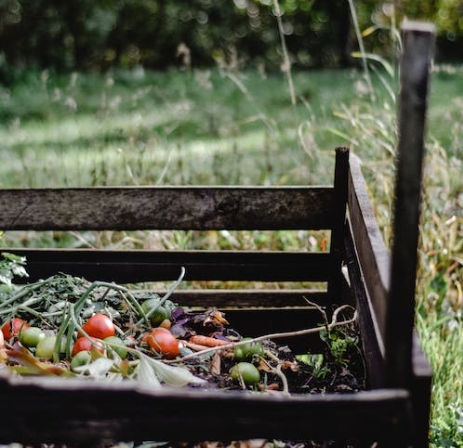Looking to Start Home Composting? We Have All the Tips you Need!

Want to live a more eco-friendly lifestyle? You could do worse than home composting. However, composting at home is not just throwing your vegetable scraps on a pile. Here are our tips for composting success.
The Benefits of Composting
Composting reduces the amount of organic waste you send to landfill which is good news for the environment. When organic waste ends up in a landfill site, it decomposes. As it rots, it produces methane, a greenhouse gas 25 times more potent than carbon dioxide. This contributes to climate change.
As well as helping the planet, composting also helps your garden. Start a compost pile and it won’t be long before you have some nutrient-rich mulch for your soil.
Choosing A Compost Bin
When choosing a compost bin, the size you opt for will depend on your needs. If you’re an avid gardener with a large outdoor space, you may want lots of mulch and a bigger bin. The same goes if you have a large family and you create a lot of food waste. Home composting bin sizes usually range from around 150 litres to a giant 1,600 litres.
Deciding On Your Composting Method
When you first start composting at home, you’ll need to decide on the method you’re going to use. As we mentioned, it’s not just about throwing things on a pile. Two commonly-used composting methods are:
The batch method
With the batch method, you put whatever you want to compost in the pile and ‘cook’ it as a batch.
The ‘as-you-go’ method
This method involves adding materials and letting them ‘cook’ as an ongoing process. We recommend this method if you’re using a compost bin.
What Should You Put in a Compost Bin?
If you’re just getting started with composting, a good place to start would be adding:
- Vegetable and fruit scraps;
- Grass clippings;
- Coffee grounds;
- Dried leaves;
- Shredded and dampened newspaper.
Before you add anything to your compost bin, add some plain garden soil or compost starter.
Tips For Home Composting Success
Get your waste ratio right
For best results, you need the right ratio of carbon to nitrogen in your compost bin. This means that the ratio of waste should be 70% ‘green’ waste to 30% ‘brown’ waste. So focus on adding more grass clippings and vegetable scraps than leaves and newspapers to your compost bin.
Turn your compost regularly
To make high-quality compost, use a fork to turn the waste regularly. The reason you need to do this is to allow air to flow through all of the waste materials. This aids in faster decomposition. We recommend that you turn your compost pile at least twice per week.
Keep your compost bin damp
Moisture also helps organic waste decompose faster. If you notice that your compost is dry, water it. Make sure that it’s just damp, but, not wet.
Stop your compost bin from smelling
Compost is waste, so it will smell, right? Not necessarily. A well-managed compost pile that’s turned regularly and has a good balance of carbon and nitrogen should not smell bad. If it does, you could be adding the wrong materials to it. Some materials like meat and dairy products give off foul odours when they start to go ‘off.’ Avoid putting these and other materials like fresh manure in your compost bin.
Follow these steps to banish pests
Pests like flies and rats are attracted to rotting waste. You need to take steps to keep them away from your compost bin.
To deter flies, keep the compost bin lid securely closed. If it has no lid, fit material like fine wire mesh over the rim to keep flies out. You’ll need to cover the air vents too with mesh netting. Food waste is particularly attractive to flies, so bury that in the middle of your compost bin. If you’ve taken these steps and your compost bin is still swarming with flies, stop putting food waste in it altogether.
If you’re finding that pests such as rats are attracted to your home composting bin, rat-proof it. Keep the lid securely closed and cover up side vents with wire netting. Avoid adding anything to your bin that rats love to eat including food scraps and meat.
Think about the location of your compost bin
The heat from direct sunlight speeds up decomposition, however, it will also dry out your compost heap. Put your compost bin somewhere where it will get the sun early in the day when it’s not too hot.
I Live in an Apartment – Is Home Composting Still Possible?
The short answer is yes. You don’t need a lot of space to start composting. However, even if it turns out that it’s not for you, you can still compost your waste elsewhere.
Introducing the Worm Bin
Before you say ‘ugh, there’s no way I’m having worms in my apartment!’, hear us out. If you’ve got a balcony or small courtyard you can use a worm bin to compost at home. This is known as vermicomposting. Use red worms rather than earthworms and put some shredded newspaper or cardboard in the bin for them. Add food scraps and they’ll eat the materials and break them down to make nutrient-rich compost.
Where Else Can I Compost?
If you live in a small space and home composting isn’t for you, you can still compost your waste.
- Find out if your local council collects compostable materials;
- Ask if your local community garden or farmers market accepts compost.
So there you have it, our simple guide to home composting success. It’s a simple way to reduce your food waste, feed your garden, and keep organic waste out of landfill.
Do you compost at home? We’d love to know your tips for success. For more interesting articles on gardening and sustainable living check out the rest of our blog.








